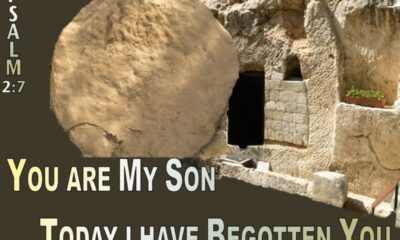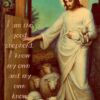He Has Done All Things Well
He Has Done All Things Well
Twenty Third Sunday in Ordinary Time (Year B)
READINGS
Isa 35.4-7; The blind shall see, the deaf hear and the dumb sing for joy.
Ps 145; My soul give praise to the Lord
Jas 2.1-5; God chose the poor according to the world to be rich in faith.
Mk 7.31-37: He makes the deaf hear and the dumb speak.
REFLECTION
1. In today’s gospel we have one of the many healing miracles worked by our Blessed Lord. He cures a man who is deaf and has a speech impediment, restoring both his hearing and his speech. The account is full of fascinating details. The man is brought to Jesus in public by his friends, and yet Our Lord takes him aside and heals him in private. The miracle is not brought about by a simple command, but through a series of sacramental actions. Christ opens the man’s ears and loosens his tongue, and then tells the man and his friends to tell no one about the miracle. How strange to heal him, and then forbid him to talk about the most important thing that had ever happened to him.
2. The question is, what is this miracle and other miracles for and what are we to learn from them in our lives of faith?
Faith is the key issue. The gospel writers, especially Mark, wrote down the miracles to demonstrate the link between the human response to God which we call faith and the superior power of God which is able to defeat the powers of evil. Faith is our response to God, in and through Jesus. Our faith in Jesus is always faith in Him as Son of God, not just as Son of Man. It would be much easier, but false, to have faith in Jesus only as man, faith in Him as a wonder worker. That would be to miss the point. We need to see the power of God behind the miracles of Jesus, and so have faith in Him as true God and true man.
3. Today’s miracle closes with the people expressing their admiration and astonishment at the cure, the healing, but with no sign of any understanding as to the real import of the miracle – which is why Our Lord gives strict instructions to everyone to keep silent about it. Here we can start to discern the connection between lack of faith on the part of the people and Jesus’ self-imposed inability to act. Later in the gospels, at the end of his travels in Galilee, we are told ‘He could do no mighty work there… and he marvelled because of their unbelief.’ The basis for their unbelief is clear: “Is not this the carpenter, the son of Mary and Joseph ?” They cannot believe that this healer is any more than a local boy who has risen above himself. It was not that they did not believe He could heal – they had seen Him do so – but they lacked faith to see that it was the power of God at work in Him. In the face of this misunderstanding, this lack of faith, He could and would do nothing for them.
4. From all these various details and episodes in the gospels, the fuller picture builds up. We can see the purpose of the miracles, that is, their teaching role in all that Jesus did. There is an essential unity between His person – who He is – and what He proclaims: the Kingdom of God. And in this proclamation, the miracles had a didactic role, just as telling as His words. The miracles are not just wonders of magic, to be amazed at. It was because they were often mistaken for just that, that Jesus so frequently insisted on secrecy from those who had been cured and those who had seen Him heal. The people misunderstood the teaching purpose of the miracles in the same way that they misunderstood His person. They failed to grasp what it truly meant to be the Messiah. He knew well that their misplaced enthusiasm was a liability in all sorts of ways, and so He wished to mitigate their misplaced enthusiasm as much as possible, by trying to keep the miracles secret.
5. Perhaps now we can see more clearly the inseparable unity between what Jesus taught and what He did. When His teaching is rejected, miracles are withdrawn; they do not happen. Those who do not respond to His teaching can have no share in salvation. Miracles are not inducements into the kingdom, like sweet candles handed out to children, to bribe them into being good. The miracles are not bribes. They can only rightly be received in the context of faith. The gifts of the kingdom cannot be bestowed on those who refuse to understand their real meaning. But those who did recognise Him as God’s anointed one, they discerned the miracles for what He meant them to be – occasions of grace, authenticating signs that it was the mighty power of God at work within Him. Signs that Jesus was not a conjuror, fortune-teller but the Messiah, the unique Saviour, long prophesied, and long expected.
6. In the gospels, people categorically fall into two groups: those who understand and those who fail to understand His true identity. ‘Understanding’ here does not mean the sort of cerebral understanding that comes through intellectual ratiocination. It means spiritual understanding, it means the wisdom of knowing Christ. Knowing who and what He is. The gospel miracles were a challenge to the crowds who followed Him. The miracles challenge people to make a decision, a response, to Jesus. Do they accept Him as Saviour, or do they reject Him? It is the same question for us too. As we read of the miracles in the gospels, they present us with the same choice. How do we respond to Christ, to His mighty works, His sublime teaching, His divinity? The miracles are a focal point for that throwing down of the gauntlet, a direct challenge to our faith. Do we see simply magic, or do we perceive instead the power and authority of the Son of God?
7. How do we respond to the miracle which is about to take place in a few minutes in our very midst – the miracle of bread and wine becoming the body and blood of Christ, a miracle which the Church describes as ‘transubstantiation’. Do we see beyond what our eyes discern to the reality of the actual presence of Christ, offering Himself to the Father, on Calvary? Do we really believe in the incarnation of Christ in the womb of the Blessed Virgin Mary through which other miracles became possible? We need to respond to the miracle of the Mass with faith in Jesus, Jesus Who is God-with-us. Without faith, the miracle of God’s Eucharist will bear no fruit within us. Certainly let our admiration for the Saviour’s miraculous presence in the Eucharist be unbounded, but woe to us if we stop at admiration. Our wonder must lead to a deepening of our faith like that of Our Mother, the Blessed Virgin Mary who was the first ambassador of/for Christ by her constant FIAT to God, and to her Son, our Saviour, who does all things well.
Doing the right thing isn’t always easy – in fact, sometimes it’s real hard – but just remember that doing the right thing is always right.
-David Cantrell
Give Thanks to God Always!






























